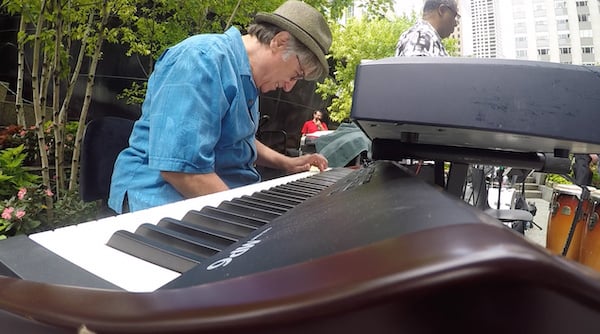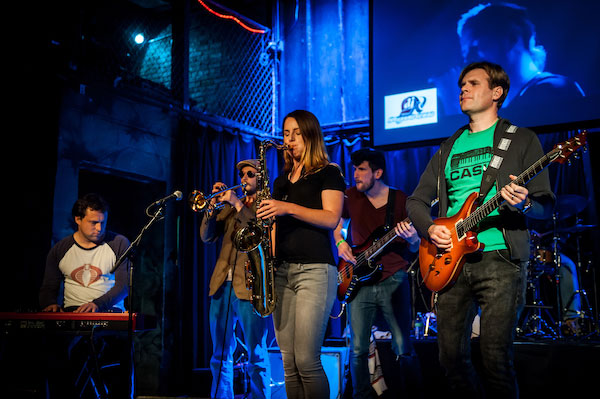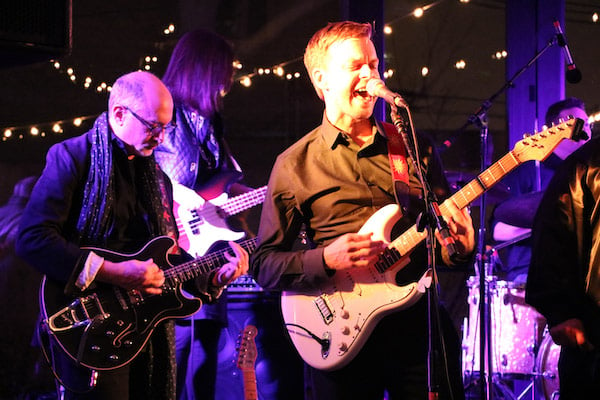A band of scientists

The CheckPoints perform with Tom Gajewksi, MD, PhD, on lead guitar and Jason Luke, MD, on trumpet. 2018 Nobel Prize recipient James Allison, PhD, fifth from left, made the breakthrough discovery in cancer immunotherapy that inspired the band's name. (Photo by Jean Lachat)
The doctor is at work. He is relaxed yet focused as the team around him comes together like a well-oiled machine.
Thomas Gajewski begins confidently, his hands measured and his fingers sure. In short order, three others step up, including colleague Jason Luke, none of them missing a beat.
Before too long, the whole team is engaged, by turns coming to the fore or falling back, waiting for cues to play their part or handing off to others as needed.
They operate as one, this large ensemble of physicians and researchers, as they offer up to an appreciative crowd “Angel of Harlem,” U2’s ode to Billie Holiday and New York City.
Gajewski lays down the song’s telltale opening guitar chords before the horns — led by Luke on trumpet — take over, stepping lightly and then letting loose with that clear C that crescendos and soars across the bar and beckons the few audience members still holding back to the dance floor.
These are The CheckPoints, and the theater they operate in this night is none other than Buddy Guy’s Legends in Chicago’s South Loop.
In their field of cancer immunotherapy, they are rock stars.
The University of Chicago Medicine is renowned for the health care it delivers and for the groundbreaking research conducted on its campus. Less well-known is that some of these leading scientists are also rock and jazz musicians who play at area venues to appreciative fans. For these researchers, hanging out in a green room is as familiar as working in the laboratory or surgical suite. You can find their work in the most prestigious scientific and medical journals — and also downloadable on iTunes.
For a group of people uniformly excelling at the highest levels at one of the premier research universities and academic medical centers in the world, their backstories share an odd commonality: several acknowledge being lackluster, uninspired or even poor students through high school and even into college.
At the same time, music thrilled them. In some ways, the music sustained and fed their creativity until they found their true calling as scientists.
The CheckPoints live
On a beautiful evening in June, Gajewski and Luke relaxed in the green room at Buddy Guy’s Legends, discussing their love of music and how The CheckPoints came to be.
Gajewski, MD, PhD, is a nationally recognized expert on cancer immunotherapy. Last year he was named one of 12 “Giants of Cancer Care” by OncLive and an Outstanding Investigator by the National Institutes of Health, which recognizes remarkable productivity in cancer research.
Oncologist Jason Luke, MD, is an expert on rare forms of melanoma who is pursuing clinical trials of immunotherapy and targeted molecular therapies to combat the deadly cancer.
But they aren’t talking about that in the club’s green room before they take the stage at a Society for Immunotherapy of Cancer (SITC) fundraiser to support early-career scientists. After offering their visitor a beer — they stick to water themselves — they describe with apparent delight how the band got together.
As is often the case in scientific research circles, this story starts at a conference.
“It was one of the Keystone meetings, and this one was in Canada. I think it was in Banff,” Gajewski said. “It’s interesting how many scientists, especially biomedical scientists, are musicians.”
He said the conference organizer suggested that anybody who plays an instrument should bring it along because at the end of the event, he was going to have a party in his room, and they could all jam. Gajewski thought that sounded like fun, so he brought his guitar.
“I thought we were going to play some music and drink some beer or whatever,” he said. “And so what happened was the last night of the actual conference — and the party was going to be the next day — [the organizer] made an announcement in front of everybody that he had a special surprise: We’re going to have live music for the whole group tomorrow in the big room.”
The Keystone Symposia on Molecular and Cellular Biology conference in spring 2007 was titled “The Potent New Anti-Tumor Immunotherapies” and featured some big names in a burgeoning field.
James Allison, PhD, then the chair of immunology at Memorial Sloan Kettering Cancer Center in New York City, had about a decade earlier made the breakthrough discovery about checkpoint inhibitors that inspired a whole field of immunotherapy research. Now at the University of Texas MD Anderson Cancer Center, he has since won nearly every significant science award, including the 2018 Nobel Prize in Physiology or Medicine.
Also presenting were Patrick Hwu, MD, a tumor immunologist at MD Anderson, and Gajewski. The five-day agenda was packed with workshops, panel discussions, keynote addresses and, of course, a poster session.
And sure enough, on the final day of the conference, which fell on April 1, right after “Social Hour with Lite Bites,” the agenda noted simply “Entertainment, 8–11 p.m.”
“So we were looking at each other — Jim Allison and Patrick Hwu and I — and we’re realizing that we’re the live entertainment,” Gajewski recalled. “So we suddenly had to learn some songs together, which we did that evening. We learned half a dozen and then it was just improvisation.”
And the next night?
“And what happened was it became a little crazy,” Gajewski said. “People were getting up and singing karaoke. There are some very reserved people in our field, conservative guys who it’s hard to find without a jacket and a tie, and they were unbuttoning their collars and taking off jackets and singing on stage.”
Gajewski grinned broadly at the memory and laughed. “Anyway, it was so much fun, we started playing regularly.”
Over the next few years, the band picked up more talent, all within the immunotherapy field, and named themselves The CheckPoints, after Allison’s discovery.
Hwu plays keyboards; Allison sings and plays harmonica. Rachel Humphrey, MD, the chief medical officer at biopharmaceutical company CytomX Therapeutics, is lead vocalist. Dirk Spitzer, PhD, a researcher at Washington University in St. Louis, lays down the beat on the drums. UCLA immunologist John Timmerman, MD, plays guitar. Brad Reinfeld, a medical student at Vanderbilt University, plays bass. Then comes the horn section: Luke on trumpet; Ferran Prat, PhD, JD, senior vice present for research administration at MD Anderson, brings his sax; and Russell Pachynski, MD, an oncologist at Washington University in St. Louis, plays trombone.
The CheckPoints, described as SITC’s house band, perform at annual meetings of both the immunotherapy society and the American Society of Clinical Oncology (ASCO). It was the ASCO meeting that brought them to Buddy Guy’s in June. Last year, they were on stage at Chicago House of Blues.
These are impressive gigs for a bunch of amateur musicians, which may help explain why these busy medical professionals make time for it.
“Playing at Buddy Guy’s this year, and at the House of Blues the past few years, has been really cool,” Luke said. “Being able to play live music is tremendously meaningful and being in front of the audience is exhilarating.”
An added benefit for Luke is bragging rights. Coming from a family of professional musicians — he called himself the “black sheep of the family” for switching to a medical career after starting college as a music major — he earned some street cred.
“Even my sister, who has some big-time credits playing at the Grammys and on ‘The Late Show,’ said ‘wow’ when she heard about it,” Luke said.
Luke’s deep, familial affinity for music is a common refrain among these physicians and researchers, and while it may speak more to how music and science are taught, it also highlights commonalities between the two.

Julian Solway, MD, director of the Institute for Translational Medicine and dean for translational medicine at the University of Chicago, can boast a number of accomplished artists in his family. His uncle, Samuel Magad, enjoyed a nearly 50-year career at the Chicago Symphony Orchestra, 34 of them as concertmaster, the prestigious role of first chair of the violin section. His cousin, Jared Rabin, is a critically acclaimed singer-songwriter. And his stepbrother, Jeffrey Siegel, is an internationally famous concert pianist.
In the spring, Solway announced $35 million in National Institutes of Health funding for the ITM, for which he is one of three principal investigators. In the summer, the 12-piece horn (think wedding) band he plays keyboards for, The Business, drew a healthy crowd when it performed outside of the John Hancock Center on Chicago’s Magnificent Mile.
Solway started playing piano at 8 years old and loved everything about it. Well, nearly everything.
“Practicing and enjoying playing the piano are not exactly the same thing,” he said.
For David Freedman, PhD, chair of the graduate program in computational neuroscience, his first instrument was a little Casio keyboard that doubled as a calculator. He started plunking out notes at 4 or 5 years old. At 11, he tried saxophone. His musical epiphany came when he picked up an electric guitar.
“I begged my parents to let me play the guitar, but this was my third instrument that I would have to take lessons on, and it wasn’t like I’d become any kind of special prodigy on the first two, so they may have been a little reluctant,” he recalled.
They probably weren’t any happier once they did buy the instrument.
“I finally got that guitar on my 13th birthday, and I just really didn’t put it down for four years,” he said. His grades suffered, his parents and his teachers worried, but midway through high school and continuing into college he found a balance when he started taking more science courses and school became more interesting.

Freedman, who co-founded jazz and funk band FuzZz with fellow UChicago neuroscientist John Alverdy, MD, executive vice chair in the Department of Surgery, was also something of a late bloomer in science.
As an undergraduate, he studied Spanish and went to medical school despite having little interest.
“I think the seminal moment that changed everything for me was when I worked in a laboratory in the middle of my surgery residency doing research,” said Alverdy, and he realized he could get very excited by the idea of “creating knowledge.”
“You could go into a laboratory, somebody would pay you to just sit around, think and do experiments with no expectation that it would actually work, but that you might actually create something in the process.
“The same thing happens with music. Four or five people sit in a room and play together, and the next thing you know, they’re writing a song.”
For Alverdy, those like-minded musicians include colleagues Jeffrey Matthews, MD, chair of the Department of Surgery; Michael Gluth, MD, director of UChicago Medicine’s Comprehensive Ear and Hearing Center; and Jack Gilbert, PhD, faculty director of the Microbiome Center.

Teamed up with a number of Pritzker School of Medicine students, UChicago Medicine surgical residents and nurses, and Matthews’ wife, Joan, a retired anesthesiologist who plays bass, they form Turnover Time, which debuted in 2011 to help raise money for annual trips to the Dominican Republic to reconstruct ears and cleft palates of children. The band hit it off big, helping raise nearly $25,000, and has kept playing at campus events periodically ever since.
Matthews’ interest in music goes beyond Turnover Time, a tongue-in-cheek reference to the period between surgeries needed to prep the operating room. In 2015 and again last year, the songwriter-guitarist recruited some professional musicians, including Earl Slick, who worked with David Bowie and John Lennon, and noted music producer Mark Hudson to lay down some tracks in a sound studio. The resulting songs can be purchased on iTunes.
And there’s Jack Gilbert. He was another late bloomer academically — he called himself a dunce in elementary and high school. “I worked hard, but I just wasn’t particularly clever,” he said. “I liked history but could never remember the details. I was crap at math.” Yet he always had an affinity for music.
“I could read music before I could read words,” he said. “My grandfather was a very talented amateur musician, and I was just fascinated by what he could do.”
Gilbert’s other talent, the talent that launched him into the ranks of the most innovative scientists working today, is connecting the dots.
“It was only when I got to university and I could just study my biology and ecology that I really found what I was good at,” he said. “I love connecting things. I love looking for patterns. And I found I could see the patterns very easily, and it just clicked.”
Gilbert is something of a nexus himself. He’s officially in the Department of Surgery with most of his Turnover Time bandmates, but runs the Microbiome Center, a joint venture of the University, Argonne National Laboratory and the Marine Biological Laboratory. He has done research with both Turnover Time’s Alverdy (preventing infections after surgery) and the CheckPoints’ Gajewski (cancer immunotherapy). He sings and plays guitar. He started out as an entomologist and microbial ecologist, but now finds himself researching bacteria progression in hospitals and what a cadaver’s gut microbiome can tell about time of death.
Connecting all those dots is an insatiable curiosity and a passionate creativity. The latest fMRI studies are finding that the key indicator of creativity in the brain might not be so much about sparking activity in a specific location but rather along the highways and byways that connect the two halves and the different areas.
“Everyone thinks of science as being very rigid rule-following,” Gilbert said. “But that’s not the case at all. What it all comes down to is our imagination.”
